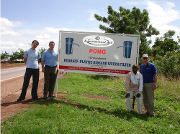
International (MNN) — Unsafe drinking water causes illness: more people have died from water-borne diseases than from war.
It's a silent crisis borne by the poor and tolerated by
those who could help end it. Lack of clean water is a problem that
keeps areas underdeveloped and keeps people in poverty, physically and
spiritually.
What difference would clean water make? Clean water meets a most basic need. Once a deprived community has safe, clean
water, they can begin dealing with the root causes of their poverty.
As this happens, communities and worldviews are
transformed. International Aid saw the
need and responded through their mission of providing hope, health and justice
for the "least of these."
Among the physical response was the development of the
BioSand Water Filter. It is a
lightweight, affordable, portable water filter capable of providing 75 gallons
of clean water per day.
The BioSand filters can provide clean water where it's desperately
needed…but how to get them there?
IA's Jim Bodenner says they recently entered into a
partnership with the United States Navy.
"The USS Swift will be arriving in the Dominican Republic with our
filters on board. A similar effort will
happen here in March: the USS Nashville will be arriving in Ghana with filters
on board. We also have filters that have been
loaded recently aboard the USS Comfort, a Navy medical ship bound for
Haiti."
With regard to ministry, Bodenner uses the example of a
project in Northern Ghana. The team made
a follow-up visit to a Muslim village they'd supplied with filters. "When
we got to that village, the chief and all of the villagers were there in
celebration to thank us for the filters that we had provided. We now have an
opportunity to go back to that community on an ongoing basis to dialogue with them about water and health, and it opens the opportunity to
share the Gospel with the people that live in that village."
"Sustainability" has become a "buzz word"
for many who are trying to raise awareness of the silent crisis. The Millennium Development Goal (MDG) aims to "reduce by
half the proportion of people without sustainable access to safe drinking water
and basic sanitation by 2015." Best case scenario is being able to address half
the need, leaving 1.1 billion more lacking clean water and sanitation.
It's an overwhelming problem. That's why Thirsting to Serve
has partnered on water projects with Rotary Clubs in Canada, the United States,
the Dominican Republic and Honduras, and with International Aid as well as the
BioSand Water Filter project.
To put the problem into a manageable context, Calvin College in Grand Rapids, Michigan, is hosting
the 5th annual Thirsting To
Serve water conference on March 6th and 7th. Global water experts ranging from the World
Health Organization to ministries that are confronting the crisis on the
frontlines will be presenting not only the problem but the solutions to conference
participants.
Click here for details on
how you can get involved.